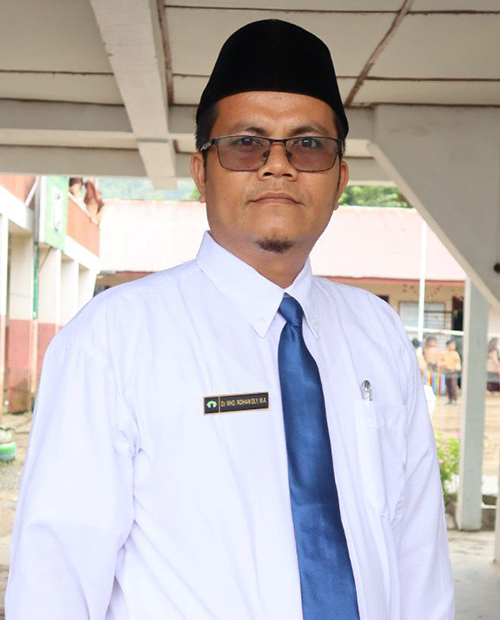Improvement of Islamic Religious Education Learning Through the Method of Giving Learning Assignments and Recitation to Grade VI Students of SDN 0213 Aek Pastak, Kec. Barumun Tengah, Kabupaten Padang Lawas
Keywords:
Islamic Religious Education, Methods of Teaching Learning Assignments, RecitalAbstract
This study aims to improve Islamic Religious Education (PAI) learning in grade VI of SDN 0213 Aek Pastak, Central Barumun District, Padang Lawas Regency through the application of learning assignment and recitation methods. This method is applied to improve students' understanding of PAI material as well as their involvement in the learning process. This study uses a quantitative approach with an experimental design involving 30 students as a sample. Data were collected through observations, tests, and interviews conducted before and after the application of the method. The results of the study showed a significant increase in student learning achievement, both in terms of understanding PAI material and the ability to speak and discuss the topics taught. The application of learning assignment and recitation methods has proven to be effective in increasing student motivation, participation, and learning outcomes. Therefore, this study recommends the use of this method as an alternative to improve the quality of Islamic Religious Education learning in elementary schoolsReferences
Arends, R. I. (2004). Teaching for Student Learning: Becoming an Accomplished Teacher.
McGraw-Hill Education.
Arikunto, Suharsimi. 1997. Dasar-dasar Evaluasi Pendidikan. Jakarta: Bumi
Berg, Euwe Vd. (1991). Miskonsepsi agama islam dan Remidi Salatiga:
Universitas Kristen Satya Wacana.
Brown, D. H. (2000). Principles of Language Learning and Teaching. Pearson Education.
Cipta.
Darmawan, D. (2007). Pendidikan Agama Islam dalam Pembentukan Karakter Siswa.
UIN Syarif Hidayatullah.
Depdiknas. (2003). Undang-Undang Nomor 20 Tahun 2003 Tentang Pendidikan
Nasional. Depdiknas.
Djamarah, S. B. (2002). Motivasi Belajar Mengajar. Rineka Cipta.
Gagne, R. M. (1985). The Conditions of Learning. Holt, Rinehart, and Winston.
Hamalik, Oemar. 2002. Psikologi Belajar dan Mengajar. Bandung: Sinar Baru
Hartoyo, R. (2000). Pembelajaran yang Aktif: Sebuah Konsep dan Implementasinya
dalam Pendidikan Agama Islam. Penerbit Kencana.
Henson, K. T. (2003). Foundations for Teaching English Language Learners: Research,
Theory, Policy, and Practice. Pearson Education.
Hill, A., & Stouffer, R. (2009). Teaching and Learning: Principles and Practice. McGraw
Hill.
Joyce, Bruce dan Weil, Marsh. 1972. Models of Teaching Model. Boston: A Liyn dan
Bacon.
Masriyah. 1999. Analisis Butir Tes. Surabaya: Universitas Press.
Mukhlis, Abdul. (Ed). 2000. Penelitian Tindakan Kelas. Makalah Panitia
Mulyasa, E. (2003). Manajemen Pendidikan: Konsep, Strategi, dan Implementasi. Bumi
Aksara.
Nunan, D. (1999). Second Language Teaching and Learning. Heinle & Heinle.
Nur, M. (2001). Dasar-Dasar Psikologi Pendidikan. Remaja Rosdakarya.
Nur, Moh. 2001. Pemotivasian Siswa untuk Belajar. Surabaya. University Press.
Pelatihan Penulisan Karya Ilmiah untuk Guru-guru se-Kabupaten Tuban.
Piaget, J. (1977). The Development of Thought: Equilibration of Cognitive Structures.
Viking Press.
Rosdakarya.
S. Nasution. (1994). Teori Belajar dan Pembelajaran. Bumi Aksara.
Santrock, J. W. (2011). Educational Psychology. McGraw-Hill Education.
Slavin, R. E. (2006). Educational Psychology: Theory and Practice. Pearson Education.
Soedjadi, dkk. 2000. Pedoman Penulisan dan Ujian Skripsi. Surabaya; Unesa
Soetomo, H. (1993). Pengantar Pendidikan: Suatu Pengantar Pemahaman Sistem
Pendidikan di Indonesia. Bumi Aksara.
Suherman, E., & Akbar, A. (2007). Metodologi Pendidikan Islam: Teori dan Praktik dalam
Pembelajaran Pendidikan Agama Islam. Alfabeta.
Surabaya.
Suryosubroto, B. 1997. Proses Belajar Mengajar di Sekolah. Jakarta: PT. Rineksa
Universitas Negeri Surabaya.
Universitas Press.
Usman, Uzer. 2000. Menjadi Guru Profesional. Bandung: PT. Remaja
Usman, M. (2000). Psikologi Pendidikan. RajaGrafindo Persada.
Vygotsky, L. (1978). Mind in Society: The Development of Higher Psychological Processes.
Harvard University Press.
Widoko. 2002. Metode Pembelajaran Konsep. Surabaya: Universitas Negeri
Downloads
Published
How to Cite
Issue
Section
License

This work is licensed under a Creative Commons Attribution-ShareAlike 4.0 International License.









